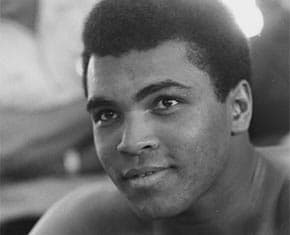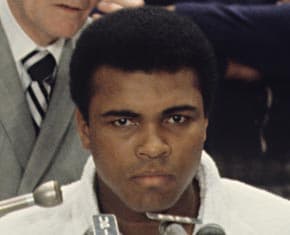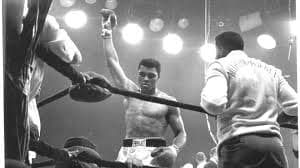

Home > Muhammad Ali > Biography
Cassius Clay Sr. gifted his son a new red-and-white Schwinn in 1954, which was promptly stolen. The 12-year-old, 89-pound Cassius Clay vowed “I'm gonna whup whoever stole my bike!” A policeman, Joe Martin, told young Cassius Clay that he better learn how to fight before he challenged anyone. After 6 months of training with Joe Martin, Cassius won his debut match in a three-round decision. Young Cassius Clay dedicated himself to boxing and training with an unmatched fervor. According to Joe Martin, Clay set himself apart by two things: He was “sassy,” and he outworked all the other boys.
Shortly after his high school graduation, 18 year-old Cassius Clay began his journey towards greatness at the 1960 Rome Olympics. His expansive personality and larger-than-life spirit earned him the nickname “The Mayor of Olympic Village.”
The future 3-time Heavyweight World Champion nearly missed the trip to Rome due to his fear of airplane travel; he insisted on bringing a parachute on the plane with him. On September 5, 1960, “The Greatest” proved his dominance in the Light Heavyweight Boxing Division by beating Zigzy Pietrzykowski of Poland, capturing the Olympic Gold Medal. Sports Illustrated praised Clay's “supreme confidence” and “intricate dance steps.”

Muhammad Ali participated in the light-heavyweight class Golden Gloves tournament for novices in 1956. It took him three years, but finally in 1959, Ali was named Golden Gloves Champion and earned the Amateur Athletic Union’s national title in the light-heavyweight division.
When Muhammad Ali refused to enter the Vietnam War draft he was stripped of his championship titles, passport, and boxing licenses. He lost an initial court battle and was facing a 5-year prison term. Muhammad Ali was the first national figure to speak out against the war in Vietnam. During his 3 ½ year layoff, Ali earned a living speaking at colleges. In 1970, with the mood of the country changing, Ali staged his comeback; first against Jerry Quarry in Atlanta, and then Oscar Bonavena at Madison Square Garden. In his next match, billed as “The Fight of the Century”, Ali faced undefeated Champion, Joe Frazier at Madison Square Garden on March 8, 1971.
Ali fought valiantly, but lost. Months later, however, he won one of the
biggest fights of his life – the Supreme Court reversed his conviction
and upheld his conscientious objector claim. Ali was free of the spectre
of prison, and once again able to box anywhere in the world.
While training for his title bout against the fearsome heavyweight
champion, Sonny Liston, Cassius Clay met Malcolm X. Malcolm became young
Clay's mentor and brought him into the Nation of Islam. Despite the 7-1
odds, Clay defeated Sonny Liston in Miami and became Heavyweight
Champion of the world in 1964. Shortly after, he announced to the world
that he was a member of the NOI and that his name was now Muhammad Ali.
Weeks later, Malcolm X left the NOI and their friendship ended. Howard
Cosell was one of the few journalists who acknowledged Ali's name change
at the time.
In 1984, Muhammad Ali publicly announced that he had Parkinson’s
disease, a degenerative neurological condition. Following his diagnosis,
he created and continues to raise funds for the Muhammad Ali Parkinson’s
Center in Phoenix, Arizona. Although his disease has progressed, Ali
remains an active public figure and philanthropist, dedicated to his
faith and humanitarian beliefs.
THE LEGEND
Muhammad Ali touches countless lives with his unwavering spirit. He was
not only a monumental athlete, but also a humanitarian and a global
citizen – the legend of Muhammad Ali goes far beyond the boxing ring.
Ali was an innovative strategist, introducing new techniques to the art of fighting. His groundbreaking approach had never been seen before.
In Ali's second fight against Sonny Liston in Lewiston, ME, Ali knocked
out Liston in the first round with a fast right. The Los Angeles Times
reported that it was 'no phantom punch.' And Sports Illustrated wrote,
"The blow had so much force it lifted Liston's left foot, upon which
most of his weight was resting, well off the canvas."
In The Rumble in the Jungle, Ali fought George Foreman in a much-anticipated battle in Zaire, Africa. Foreman was known for his strength, while Ali was known for his speed and agility. However, Ali spent most of the match leaned up against the ropes covering up and allowing Foreman to punch his arms and body. This tactic drained Foreman of his energy with seemingly little impact on Ali. In the 8th round, a tired Foreman once again tried to pin Ali against the ropes. This time, Ali pounced and landed several punches – ultimately knocking down Foreman, winning the match and reclaiming his title.
Ali didn’t just win with his fists, he was infamous for taunting and baiting his opponents leading up to the fight and even in the ring with his cunning and clever words. His pre-fight theatrics for the media were very entertaining and would often get into the heads of his opponents, disrupting their mental game. During Rumble in the Jungle with George Foreman, Ali taunted him with “They told me you could punch, George!” According to Foreman: “I thought he was just one more knockout victim until, about the seventh round, I hit him hard to the jaw and he held me and whispered in my ear: ‘That all you got, George?’ I realized that this ain’t what I thought it was.”

Ali trained for his first ‘comeback’ fight at a mink farm in Reading, PA in 1971, a setting where he could train without being harassed by fans and reporters. Inspired by the secluded setting, Muhammad Ali established a training camp in the countryside in the village of Deer Lake. This became the place where he trained for all of his fights from 1972 until the end of his career. Ed Schuyler of AP News said, “The best time to talk with him [Ali] if you wanted to do it alone was at Deer Lake. He was a different person when he was alone. He’d talk very quietly and somberly, but you rarely had him alone for long...”
Muhammad Ali was the Heavyweight Champion of the world in 1967, but he began one of his biggest ‘fights’ when he refused to be inducted into the armed forces to fight in the Vietnam War. Ali was arrested, stripped of his titles, and exiled from boxing for 3 years. He cited religious reasons for not entering the draft, and his opposition was highly controversial. He became a voice for a generation that felt American military involvement in Vietnam was wrong, and his willingness to speak out against it earned him many detractors. Ali never wavered. His conviction was overturned in 1971, and he went on to earn back his World Heavyweight Champion title in 1974.
Muhammad Ali’s polarizing decision inspired Americans of all backgrounds. New York Times columnist, William Rhoden, wrote, "Ali's actions changed my standard of what constituted an athlete's greatness. Possessing a killer jump shot or the ability to stop on a dime was no longer enough. What were you doing for the liberation of your people? What were you doing to help your country live up to the covenant of its founding principles?"
Muhammad’s life and career have been played out as much on the front pages of newspapers as on the inside in the sports pages. His early relationship with the Nation of Islam and his insistence on being called Muhammad Ali instead of his “slave name”, Cassius Clay, heralded a new era in black pride. His refusal to be inducted into the United States Army anticipated the growing antiwar movement of the 1960s. His willingness to stage his much-promoted and publicized fights in such far-flung locales as Kinshasa, Manila, and Kuala Lumpur signaled a shift from superpower dominance toward a growing awareness of the developing world.
Muhammad brought extraordinary speed and grace to his sport, while his charm and wit changed what the public expected of a boxer. His accomplishments in the ring are the stuff of legend – two fights with Sonny Liston, where he proclaimed himself “The Greatest” proved he was; three epic wars with Joe Frazier; the stunning victory over George Foreman in the Rumble in the Jungle; and the dethroning of Leon Spinks that led to Ali becoming the heavyweight champion for an unprecedented third time.
On October 30, 1974, Ali battled against George Foreman in the stifling heat of Zaire. It was one of the most anticipated championship fights ever. Foreman was the reigning world champ, younger than Ali, and a huge favorite. He had demolished both Joe Frazier and Ken Norton, the only two fighters who had beaten Ali at that time. Yet Ali claimed to have a secret plan for defeating Foreman. Ali put his famous Rope-A-Dope tactic into action, winning the bout in the 8th round.
In 1971, Ali took on Joe Frazier, the fighter who was given Ali’s title after Ali declined draft induction. Both fighters had a legitimate claim to the title. The who’s who of Hollywood was in attendance – or wanted to be – at Madison Square Garden. Frank Sinatra claimed a place at the bout as a photographer for Life Magazine, as it was the only way he could get into the Garden. Ali lost via unanimous decision after 15 brilliant and brutal rounds.
Considered one of the greatest fights of the 20th century, Ali-Frazier III, was a brutal 14 round slugfest. The mood of the fighters and their training camps were completely opposite prior to the fight. Ali felt Frazier was past his prime, that he was doing Smokin’ Joe a favor by giving him one big payday before retirement. He and his trainers were relaxed and confident. Joe Frazier was dead serious, training as hard as he ever had. Muhammad’s constant needling of Joe – Ali claimed he was only trying to generate publicity – had gotten under Frazier’s skin.
Uncharacteristically, Ali did not dance, but came out flat-footed, charging straight at Frazier to begin the bout. For the first few rounds, Ali threw a flurry of brutal combinations that had Frazier staggering at times. Showing dogged determination, Frazier kept coming back at Ali, absorbing grinding punishment, and finally getting in shots of his own.
Everyone agreed the two men were punishing each other in great boxing style. No one could predict that both fighters could hold up for 14 rounds of vicious punishment in Manila’s heat. The fight went down to the wire, with Ali pulling out the victory via TKO. Ali stated to his trainer, “Man, this is the closest I’ve ever been to dying.”
There has always been far more to Muhammad than what took place in the boxing ring. He was fearless in his stance on civil rights, fighting for people suffering injustices in the United States and the rest of the world.
Daring to go against political policy to help people in need, Muhammad has made goodwill missions to Afghanistan and North Korea; delivered sorely needed medical supplies to an embargoed Cuba; traveled to Iraq and secured the release of 15 United States hostages during the first Gulf War; and journeyed to South Africa to meet Nelson Mandela upon his release from prison.
THE INFLUENCE
Ali inspires millions worldwide. He gives people hope and proves that anyone can overcome insurmountable odds. He gives people courage. He makes fighters of us all. This is Ali and there will never be another.
Muhammad Ali has continually been recognized for his contributions to sports and has been the recipint of many awards for his humanitarian efforts.
